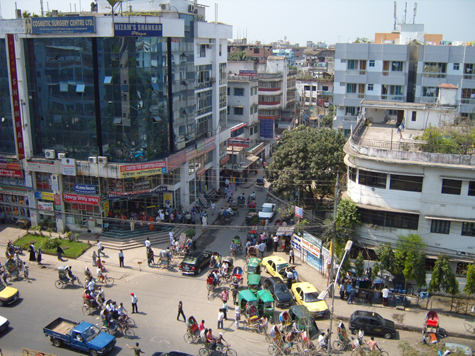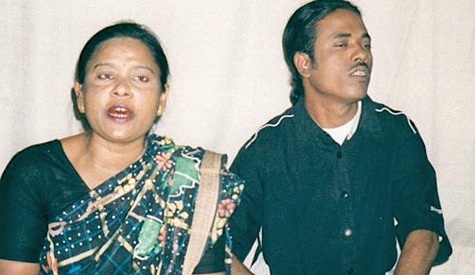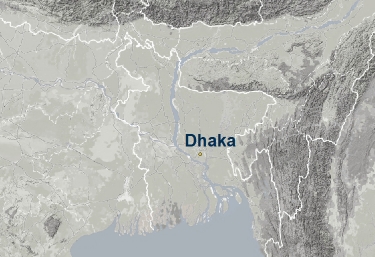Dhaka, Bangladesh. 23 December 2004. Monjila
excerpt from an interview
shato sadhanar bale
Monjila is a singer of bichchhed gaan and pala gaan who lives in Dhaka. I met her through the Bangladeshi filmmaker, my friend, Tareque Masud; she had played herself in his and Catherine Masud’s documentary on the oral history of the 1971 Bangladesh Liberation War, Muktir Kotha (Words of Freedom, 1999) for which I had also composed a song, and her provocative and fearless comments on gender and social inequality were in circulation among our friends in Dhaka. Later, with Tareque’s feature Matir Moyna (The Clay Bird, 2002), we came together again on the same project, but met only two years later.

Street Corner, Dhaka, Bangladesh
This session took place in Tareque’s office in Dhaka. It was my first trip to Dhaka for fieldwork. Shah Alom Boyati, or Boyatibhai as we all call him, folk singer and actor who has been a very supportive guide in the first phase of my Bangladesh work, had made arrangements for this session. But it had turned out to be a rather heavy day with the Kushtia baul Bolai Shah debating with Pagla Bablu of Faridpur, who is a popular folk singer, about whether or not this music should be recorded. Bolai Shah said he would sing but I could not record, because truths held in his songs demanded a certain commitment and preparation on the part of the listener and such knowledge could not be freely imparted to any or everyone. Pagla Bablu had no problems with the recording. Ebadat, Bolai Shah’s gurubhai (disciple of the same guru), remained silent. I started to feel like an intruder and kept switching off my recorder and turning it on, depending on who was singing. When it came to Ebadat’s turn and I was about to stop the recording, he said he’d like to be recorded. All in all, the day had been stressful and I was regretting that Sukanta was not there with me.

Monjila and Nazrul
When Monjila came with the dhol player Nazrul later in the afternoon, it was a great relief for me. She filled the room with her energy. She sang a couple of songs, among them this composition of the rebel poet-singer from Dhaka region, Mataal Rajjak, and there was something of his rebellion and sarcasm reflected in her voice too.
Later Monjila and I went into another room in the office for a conversation and she told me about the many seductions of music and her continuous battles to keep her art alive, despite barriers on all sides—home, husband, the music market, male singers and so on. A line she repeated many times during the conversation was, Ami to shilpi (I am an artist after all).
Written in 2010.
- Saptiguri, North Bengal. 27 November 2003. Nirmala Roy
- Bolpur, Birbhum. 25 November 2003. Nimai Chand Baul
- Kolkata. 4 September 2019. Purnadas on Nabani Das Baul
- Surma News Office, Quaker Street, East London. 27 February 2007. Ahmed Moyez
- Ambikapur, Faridpur, Bangladesh. 29 April 2006. Hajera Bibi
- Sylhet, Bangladesh. 22 April 2006. Chandrabati Roy Barman and Sushoma Das
- Sylhet, Bangladesh. 21 April 2006. Arkum Shah Mazar
- Sylhet, Bangladesh. 20-21 April 2006. Ruhi Thakur and others
- Jahajpur, Purulia. 27 February 2006. Naren Hansda and others
- Faridpur, Bangladesh. 24 January 2006. Binoy Nath
- Uttar Shobharampur, Faridpur, Bangladesh. 22 January 2006. Ibrahim Boyati
- Baotipara, Faridpur, Bangladesh. 21 January 2006. Kusumbala Mondal and others
- Kumar Nodi, Faridpur, Bangladesh. 21 January 2006. Idris Majhi and Sadek Ali
- Debicharan, Rangpur, Bangladesh 18 January 2006 Anurupa Roy & Mini Roy, Shopon Das
- Mahiganj, Rangpur, Bangladesh. 17 January 2006. Biswanath Mahanta & Digen Roy
- Chitarpur, Kotshila, Purulia. 28 November 2005. Musurabala
- Krishnai, Goalpara, Assam. 30 August 2005. Rahima Kolita
- Chandrapur,Cachar. 28 August 2005. Janmashtami
- Silchar, 25 August 2005, Barindra Das
- Kenduli,Birbhum. 14 January 2005. Fulmala Dasi
- Kenduli, Birbhum. 13 January 2005. Ashalata Mandal
- Shaspur, Birbhum. 8 January 2005. Golam Shah and sons Salam and Jamir
- Bhaddi, Purulia. 6 January 2005. Amulya Kumar, Hari Kumar
- Srimangal, Sylhet. 27 December 2004. Tea garden singers
- Sylhet, Bangladesh. 26 December 2004. Abdul Hamid
- Dhaka, Bangladesh. 24 December 2004. Ali Akbar
- Changrabandha, Coochbehar. 16 December 2004. Abhay Roy
- Santiniketan, Birbhum 27 Nov 2004 Debdas Baul, Nandarani
- Tarapith, Birbhum. 14 October 2004. Kanai Das Baul


